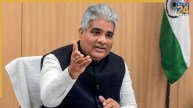Sri Lanka assured India on Monday that its territory will not be used in any way that threatens India’s security. This assurance was officially confirmed in a joint statement issued after a comprehensive dialogue between Sri Lankan President Anura Kumara Disanayaka and Indian Prime Minister Narendra Modi in New Delhi.
The statement emphasized that Sri Lanka would not permit its land or waters to be used for operations that could negatively impact India’s security or regional stability. This commitment comes at a critical time, as China has been increasingly active in the Indian Ocean, particularly around Sri Lanka. Beijing’s growing influence in the region is seen as a challenge to India, with its strategic interests at stake.
#WATCH | Prime Minister Narendra Modi and Sri Lankan President Anura Kumara Dissanayake meet at Hyderabad House, in Delhi.
— ANI (@ANI) December 16, 2024
(Video: DD News) pic.twitter.com/plfHh4AfZ6
China took control of Sri Lanka’s Hambantota Port on a 99-year lease in 2017 after Sri Lanka struggled to repay a significant debt. Since then, Chinese naval and surveillance ships, including the Yuan Wang 5—a large tracking and missile-detection vessel—have regularly docked at Hambantota, raising security concerns for India due to the port’s proximity.
In August 2022, India raised concerns with Sri Lanka over the docking of Chinese ships, prompting Colombo to initially ask Beijing to delay the arrival of the Yuan Wang 5. However, Sri Lanka later allowed the vessel to dock and Chinese ships have continued to frequent the port.
The Yuan Wang 5 is equipped with advanced tracking and communication systems that can detect foreign satellites, aircraft, and missile systems, heightening India’s concerns about its strategic implications.
The India-Sri Lanka agreement today solidifies the two countries’ commitment to ensuring the security and stability of the region. Prime Minister Modi and President Disanayaka reaffirmed the strength of their bilateral ties, which are grounded in deep historical, cultural, and geographical connections.
“As natural partners, both leaders underscored the common challenges faced by the two countries in the Indian Ocean Region and reaffirmed their commitment to work together in countering traditional and non-traditional threats as well as to ensure a free, open, safe and secure Indian Ocean Region. India being Sri Lanka’s closest maritime neighbour, President Disanayaka reiterated Sri Lanka’s stated position of not permitting its territory to be used in any manner inimical to the security of India as well as towards regional stability.” the Ministry of External Affairs said in a press statement.
Also Read: Major Steps Taken In Delhi NCR To Tackle Pollution And Extreme Cold – Details Inside!












